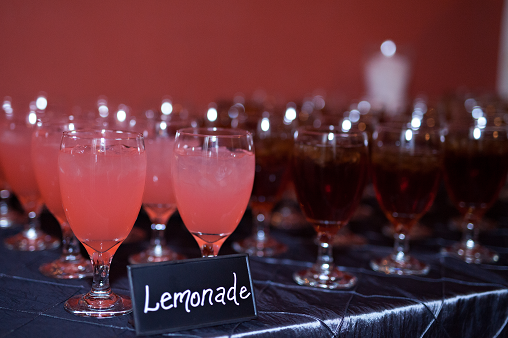The latest trend in wedding food is to get BBQ joints or our other favorite restaurants to cater. Not only does it save money, but quite often the food tastes so much better than traditional wedding caterers. You’ve seen me recommend this type of caterer on the website, in my post on Blue Moon BBQ. Shoot, I even served BBQ at my own wedding (although I like to think that this was before it was the on-trend thing to do).
However, it is important for the bridal couple to realize that catering a wedding is not the same as catering a backyard family get-together, or even the same as catering a large party. With a wedding the caterer needs to consider delivery & set-up times, set up location, venue limitations, and so much more. In this post I’ll explain the components of a good wedding catering contract. And trust me, you want every single one of these points in writing, in the contract.

Who is going to scrape the plates?
I’ll start with a story. At one of my first weddings as an independent coordinator, I provided wedding coordination for a gorgeous barn wedding. With coordination packages, the bridal couple books all of their own vendors, and I come in at the end to ensure set-up, break-down, and keep the event on a timeline. At this particular venue, which shall remain nameless (and don’t worry, it isn’t any venue that I have recommended on this site), the venue contract included “set-up” and “clean-up” for an extra cost. I won’t share the exact sum, but it was a large enough amount that when the bride told me it included putting out place settings and scraping plates and packing them back into their boxes, I didn’t doubt her.

I arrived several hours early to begin set-up of floral décor, which was a big project for this wedding. As the ceremony time drew closer and closer, we still had no plates and glasses on the tables. Upon finding the venue representative, we learned that set-up and clean-up actually meant that the venue would arrange and take down tables, but nothing else. It was two hours before ceremony and we had boxes of plates, glasses, and silverware for 150 chairs to unpack. With such little time, I had no time to debate with the venue. I grabbed the groomsmen and we got to work!
But when it came time to scrape the plates, we couldn’t use the groomsmen; it was time for them to party! And let me tell you, as a wedding coordinator, I do not scrape plates. I don’t make nearly as much as that venue charged for one man to move some tables around.
In the end, the venue had to scrape the plates, since their contract was very vague and said nothing about setup and cleanup as limited to tables. The moral of the story for couples is to always, always, always, check to see who is scraping and packing away the plates. In most cases, this should be your caterer. Get this in writing in your contract, and make sure that the caterers are not leaving until every plate is packed away.
Taking out the Trash
Along the same lines as scraping plates, make sure that your caterer agrees to take out the trash at the end of the night. They should plan to bring their own trash bags. I have also run across several local venues that do not provide their own trash cans. Check with your venue, and if you need trash cans, rent them from your party rental company.
Who is cutting the cake?

At another wedding early in my career, the caterer served food, scraped plates, and then left within an hour. When it was time to cut the cake, we realized there was no one there to slice and serve it. I had to bring out my cake-cutting skills, and boy did I make a mess. Trust me, you do not want me cutting your cake. A good catering contract will include an agreement to cut and serve the cake. If your caterer will not serve the cake, sometimes the bakery will send someone at an extra charge. Whichever route you choose, again, be sure you have this in writing.
The Details
A good catering contract will include all the little details that you want in writing. First, make sure the caterer is clear on the time to serve food, and schedule delivery time to allow enough time for set-up. The caterer will need information on the venue, such as kitchen availability, refrigerators & warmers, and location of the reception. Food will spoil quickly at an outdoor wedding in July, so your caterer needs this information in order to be prepared.
One of the ways that the caterer may keep your food hot is by using chafing dishes with open flames. This can be a big problem with some venues, especially with the historic homes that I often work with, which do not allow open flames of any kind. I have had numerous conversations with caterers who promise that they will not bring open-flame warmers, but did so anyway. Open flame is a liability to historic homes, and will be in direct violation of your contract with that venue, which in the end will fall on you as the couple. If your venue does not allow open flames, be sure this is confirmed in your catering contract.
Next, consider that you will be so busy on your wedding day, you’ve probably skipped a meal or too. During the wedding itself, you will spend so much time visiting with guests that you might not end up finishing your meal. As your wedding planner, I try to get the couple starting on their own food while the rest of their guests are being served. However, you’ve been going and going nonstop all day, and dancing all night, so you will still be starving at the end of the night. I strongly suggest asking your caterer to prepare two to-go meals to take with you. Once you are relaxing in your hotel, you will really appreciate that plate of food and cake.

Finally, don’t forget to include vendor meals in your catering plan. Many vendors will require a hot meal when they will be spending 5 or more hours on site. Even if it is not required in your contract, some of us will be spending all day with you, so it’s a nice gesture!
Conclusion
Over the years, I learned valuable lessons when booking caterers, and now I’m here to make sure you don’t repeat my early mistakes. When I am not the planner in charge of booking vendors, but only serving as month-of coordinator, I now do a review of all vendor contracts for these types of details. If something seems amiss, I can make recommendations to the couple before the big day, so that we can catch problems before they occur. If you need a wedding planner or coordinator in Middle Tennessee, email me at kelsey@kelseygrayevents.com
*** Disclaimer: The materials available at this web site are for informational purposes only and not for the purpose of providing legal advice. You should contact your attorney to obtain advice with respect to any particular issue or problem.




